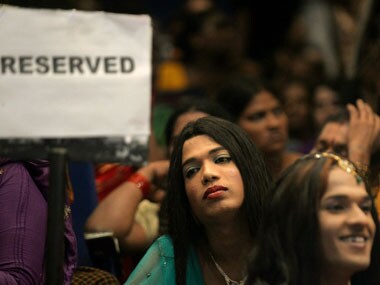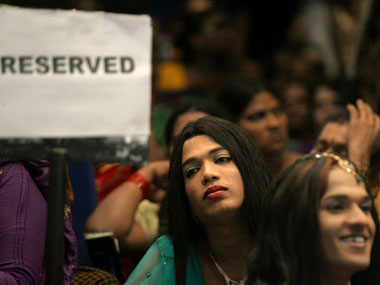The Narendra Modi government has challenged a SC judgement on transgenders. In what was hailed as a landmark judgement by the country’s apex court, especially after its scrapped Delhi HC’s order decriminalizing Section 377, the Supreme Court directed the government to recognise transgenders as ’third gender’. In its ruling, it said that the third gender should be extended the privileges the government extends to OBCs as their social and economic condition was far from satisfactory. A
Times of India
report from April had stated: “This is for the first time that the third gender has got a formal recognition. The third gender people will be considered as OBCs, the SC said. The SC said they will be given educational and employment reservation as OBCs. The apex court also said states and the Centre will devise social welfare schemes for third gender community and run a public awareness campaign to erase social stigma.” However, the Narendra Modi government has now moved the apex court and challenged its order, raising objections to several aspects of the 15 April judgment. According to a report in
The Indian Express
newspapers, the government has questioned the practicality and political implications of categorising transgenders as OBCs. [caption id=“attachment_1707143” align=“alignleft” width=“380”]
 Transgender people at a rally. AFP.[/caption] The Modi government, represented by Attorney General Mukul Rohatgi, has contested the court’s ruling and said that it isn’t feasible to group transgenders with OBCs as some of them might already be from backward classes and hence it’s problematic to classify them as OBCs on the basis of their gender identity. They have also protested against the idea of categorising the transgenders as OBCs in a ‘suo motu’ exercise and said that the community can enjoy OBC status only after the National Commission for Backward Classes (NCBC) take a decision on the issue. The Centre also questioned the SC directive that said the word ’transgender’ can also expanded to include the entire LGBT (lesbian, gay, bisexual, transgender) community.
The Hindustan Times quotes
from the government’s appeal as follows: “Asking the court to modify its order, it added, “Caste is determined by birth. It is an intricate question and clubbing them all as one category may pose problems both practically and politically. They (transgenders) may be separated from their families and living in groups but that does not mean they have converted to other castes.” However, it is not difficult to see how the government seems to have ignored the intention behind the Supreme Court judgment by voicing apprehensions about how the move might disturb the existent caste laws. They even said that since a lot of the transgenders might have been born to different castes, it is wrong to club them as OBCs. In contesting the Supreme Court’s judgment, the government has effectively stated that the needs of a severely marginalised, mostly impoverished and blatantly exploited community of the country comes only second to the apparent sanctity of India’s existent caste law structure. Moreover, the government, in questioning why transgenders from other castes - possibly even upper castes - should be extended privileges of OBCs have displayed deep ignorance or deep disregard for the condition of the community in India. Most transgenders, even if they are born in an upper caste, cannot survive for too long in Indian society without grouping with others from the community. There have been several reports of police atrocities, and sexual assault against them. Nothing about their social and political reality makes them any less disenfranchised than a backward caste. While the state has contested the Supreme Court’s judgment on the grounds of practicality, ironically enough, the apex court’s ruling is in the circumstances, one of the most practical and effective solutions to the transgender population’s trials. The court actually directed the government to turn to an existent and successfully implemented policy framework - meant to address the needs of backward, disenfranchised communities - and apply it to the the equally vulnerable transgender community. In doing so, the court clearly tried to avoid the bureaucratic and political hurdles that face the formulation and implementation of any new policy in India. In the restless, sharply divided and even whimsical political climate of India, a new policy for the development of transgenders would definitely be pushed to the back-burner and would possibly even never see the light of the day. In a
census conducted this year
, the official count of transgenders was pegged at 4.9 lakh, though activists have said that the real number was six times the official number. In a
report submitted
to the UNDP by the Centre for Sexuality and Health Research and Policy and the Alternative Law Forum, it was noted why the transgenders continue to be exploited in the society. It says, " A primary reason (and consequence) of the exclusion is the lack of (or ambiguity in) legal recognition of the gender status of hijras and other transgender people. It is a key barrier that often prevents them in exercising their civil rights in their desired gender.” It also notes, “It is a key barrier that often prevent them in exercising their rights related to marriage with a person of their desired gender, child adoption, inheritance, wills and trusts, employment, and access to public and private health services, and access to and use of social welfare and health insurance scheme.” The report links this lack of legal recognition to the escalating incidents of HIV+ among the transgender community as they not only face poverty and have to turn to sex work for survival they are routinely sexually abused, leading to diseases. Given the stigma around their existence, it’s also equally difficult for them to both afford and avail medial aid. It also suggests various ways the government can recognise transgenders. However, with important state polls coming up, the Modi government seems like it would rather play to the galleries and assure people that it’s possibly fine to have a few prejudices like these.
Transgender people at a rally. AFP.[/caption] The Modi government, represented by Attorney General Mukul Rohatgi, has contested the court’s ruling and said that it isn’t feasible to group transgenders with OBCs as some of them might already be from backward classes and hence it’s problematic to classify them as OBCs on the basis of their gender identity. They have also protested against the idea of categorising the transgenders as OBCs in a ‘suo motu’ exercise and said that the community can enjoy OBC status only after the National Commission for Backward Classes (NCBC) take a decision on the issue. The Centre also questioned the SC directive that said the word ’transgender’ can also expanded to include the entire LGBT (lesbian, gay, bisexual, transgender) community.
The Hindustan Times quotes
from the government’s appeal as follows: “Asking the court to modify its order, it added, “Caste is determined by birth. It is an intricate question and clubbing them all as one category may pose problems both practically and politically. They (transgenders) may be separated from their families and living in groups but that does not mean they have converted to other castes.” However, it is not difficult to see how the government seems to have ignored the intention behind the Supreme Court judgment by voicing apprehensions about how the move might disturb the existent caste laws. They even said that since a lot of the transgenders might have been born to different castes, it is wrong to club them as OBCs. In contesting the Supreme Court’s judgment, the government has effectively stated that the needs of a severely marginalised, mostly impoverished and blatantly exploited community of the country comes only second to the apparent sanctity of India’s existent caste law structure. Moreover, the government, in questioning why transgenders from other castes - possibly even upper castes - should be extended privileges of OBCs have displayed deep ignorance or deep disregard for the condition of the community in India. Most transgenders, even if they are born in an upper caste, cannot survive for too long in Indian society without grouping with others from the community. There have been several reports of police atrocities, and sexual assault against them. Nothing about their social and political reality makes them any less disenfranchised than a backward caste. While the state has contested the Supreme Court’s judgment on the grounds of practicality, ironically enough, the apex court’s ruling is in the circumstances, one of the most practical and effective solutions to the transgender population’s trials. The court actually directed the government to turn to an existent and successfully implemented policy framework - meant to address the needs of backward, disenfranchised communities - and apply it to the the equally vulnerable transgender community. In doing so, the court clearly tried to avoid the bureaucratic and political hurdles that face the formulation and implementation of any new policy in India. In the restless, sharply divided and even whimsical political climate of India, a new policy for the development of transgenders would definitely be pushed to the back-burner and would possibly even never see the light of the day. In a
census conducted this year
, the official count of transgenders was pegged at 4.9 lakh, though activists have said that the real number was six times the official number. In a
report submitted
to the UNDP by the Centre for Sexuality and Health Research and Policy and the Alternative Law Forum, it was noted why the transgenders continue to be exploited in the society. It says, " A primary reason (and consequence) of the exclusion is the lack of (or ambiguity in) legal recognition of the gender status of hijras and other transgender people. It is a key barrier that often prevents them in exercising their civil rights in their desired gender.” It also notes, “It is a key barrier that often prevent them in exercising their rights related to marriage with a person of their desired gender, child adoption, inheritance, wills and trusts, employment, and access to public and private health services, and access to and use of social welfare and health insurance scheme.” The report links this lack of legal recognition to the escalating incidents of HIV+ among the transgender community as they not only face poverty and have to turn to sex work for survival they are routinely sexually abused, leading to diseases. Given the stigma around their existence, it’s also equally difficult for them to both afford and avail medial aid. It also suggests various ways the government can recognise transgenders. However, with important state polls coming up, the Modi government seems like it would rather play to the galleries and assure people that it’s possibly fine to have a few prejudices like these.
Modi govt's move to oppose SC's development plan for transgenders is wrong
Piyasree Dasgupta
• September 12, 2014, 07:51:18 IST
The Modi government’s move to oppose SC’s recognition of transgenders is regressive.
Advertisement
)
End of Article